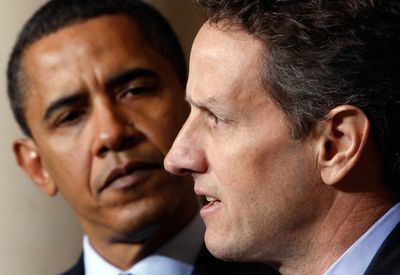Obama puts cap on executive pay
Limits aim to protect ailing businesses

WASHINGTON – President Barack Obama’s new limits on executive compensation are designed to keep executives of faltering companies from taking home huge compensation packages despite their businesses crashing and taxpayers bailing them out.
The new rules also seek to focus executives on long-term gains by permitting them to receive company stock that could be cashed in only after the companies are going well enough to begin repaying their federal aid.
“We all need to take responsibility,” Obama said at the White House on Wednesday with Treasury Secretary Timothy Geithner at his side. “This includes executives at major financial firms who turned to the American people, hat in hand, when they were in trouble, even as they paid themselves customary lavish bonuses.”
But the rules, although tight by traditional Wall Street standards, would apply not to executives of companies that have already received massive federal aid – companies such as Detroit automakers and major Wall Street financial institutions – unless they sought further bailouts.
For smaller aid recipients, the new restrictions will be waived if executive pay is made public.
The rules, which take effect immediately and do not require Congressional approval, were designed to meet two goals. First, the White House wants to demonstrate that the president is a vigilant steward of the public’s money at a time when he is proposing to spend almost $1 trillion of it on an economic stimulus program and Republicans are attacking the plan as wasteful and ineffective.
Second, the rules were announced even as Obama’s economic team works feverishly to craft a master plan for spending the remainder of the $700 billion bailout fund approved by Congress last year – a plan that could open the way to requests for more money to shore up the still-dysfunctional financial system.
And Obama’s tough talk about corporate responsibility is designed to lay the political groundwork not just for growth in his economic stimulus package as it wends its way through Congress, but also for the possibility of more bailout money in the near future.
Geithner alluded ominously to the gathering storm clouds on Wednesday, as he credited the bailout approved last fall with preventing a greater disaster.
“Those actions were absolutely necessary to prevent much greater damage than what we have seen today,” he said, “and we will have to do more – substantially more – to fix this crisis.”
Under the new rules, companies that receive “exceptional financial recovery assistance” will not be allowed to pay senior executives more than $500,000 in total annual compensation.
The exception would be for grants of stock or other long-term incentives that contain restrictions specifying that they could be cashed in only after the government has been repaid or after a set period that took into account how the company had been repaying the federal money.
The restriction would be unbending for firms that get exceptional assistance from the federal government, although healthier banks applying for money from the Troubled Asset Relief Program would be able to waive the rule if they publicly disclosed what they were doing.
In both cases, executive compensation will be subject to a nonbinding vote of shareholders.
The $500,000 cap is low by Wall Street standards. The chief executive of Bank of America earned $20.4 million in 2007, a year before his institution hit such hard times that it took $45 billion in government bailout money.
The provisions reflect what the president says is his desire to protect taxpayers while also preserving the basic free market approach to executive pay: Successful business leaders could reap big rewards – if they succeeded over time.